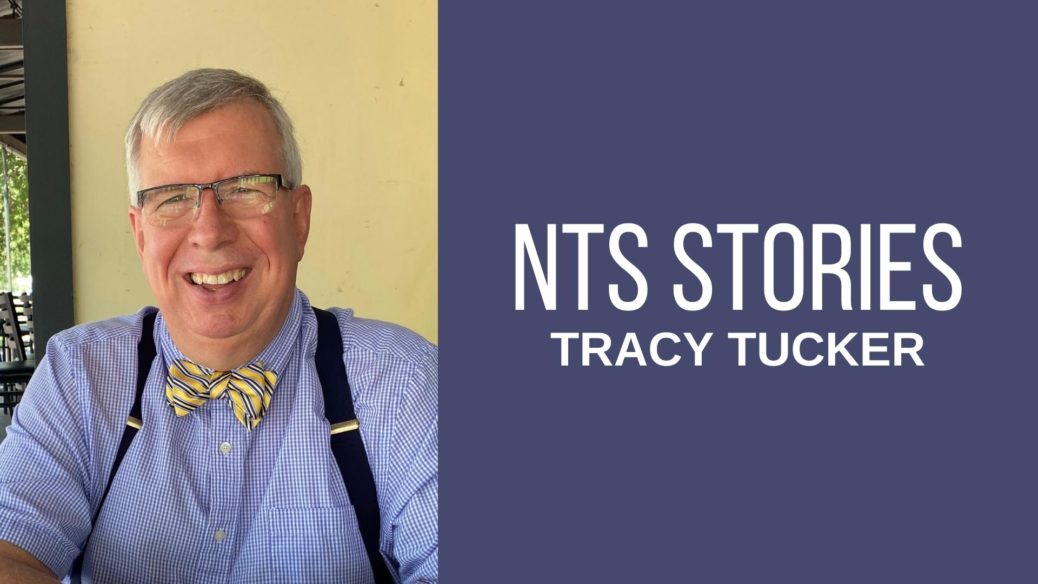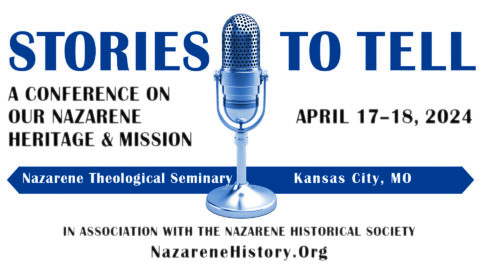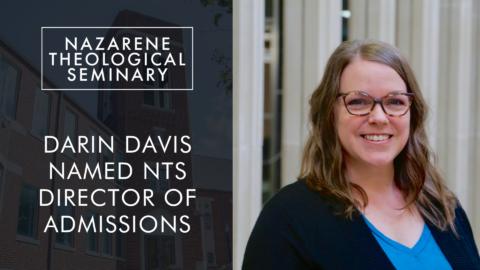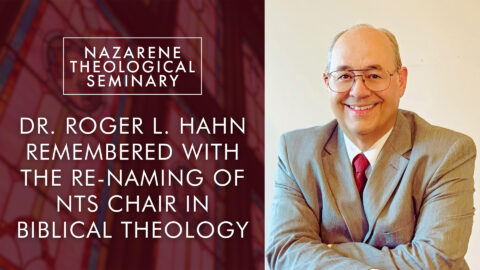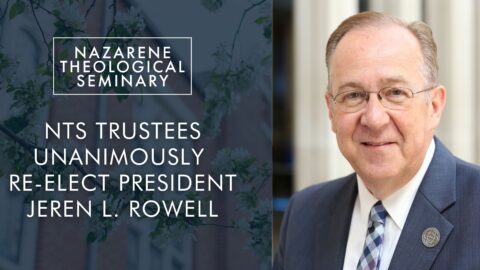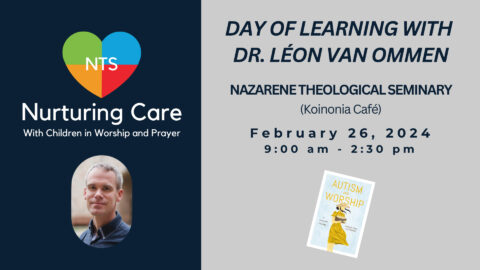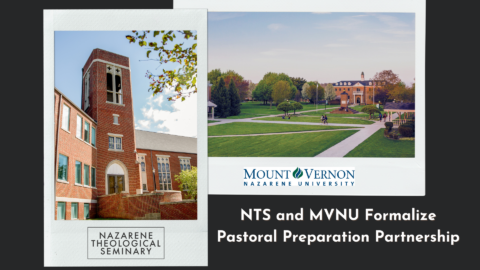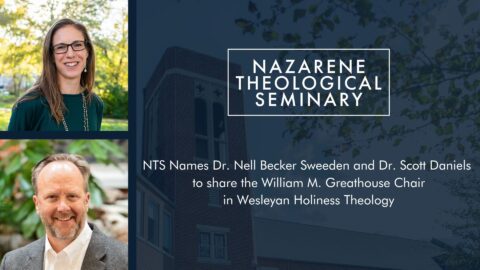Being with people is the best part of Tracy Tucker’s (Class of 1986) ministry at Community Hospice in northern Florida. So, it’s no surprise the relationships and time spent with classmates at Nazarene Theological Seminary (NTS) are the highlights of his seminary experience that have remained with him over the years.
‘God can use even me’
Tucker’s journey to chaplaincy began at NTS.
Right after he married Denise in late 1981, they moved to Kansas City where he enrolled at the seminary in January 1982. Only in his last couple years at Trevecca Nazarene College (now University) had he committed to theological study, without a clear idea of where God was calling him. As an undergrad at Trevecca, “I wasn’t very mature for my age,” he said. “I didn’t know what I wanted to do when I grew up.”
He chose NTS to stay within his theological tradition, having grown up in a Nazarene church.
“The first lecture of the Church History class, Dr. Paul Bassett was teaching… I’ll never forget how this first lecture made so much sense to me,” Tucker said.
Bassett spent that first session narrating the story of God’s people starting with Abraham and proceeding through the Old Testament, and then the New Testament, and into the history of the early Church. His objective was to illustrate how God uses imperfect people to accomplish his purposes. Toward the end of class, while Bassett was still lecturing, another professor opened the classroom door and marched in with his podium and sound system, and the microphone draped around his neck. The podium was stacked with books so high that he couldn’t see around them.
“He was oblivious to the lecture that was going on. He crossed the classroom right in front of Dr. Bassett. All of us were stunned. He set his books down and noticed he was standing right in front of a professor giving a lecture. He became very apologetic, picked up his books and podium and was leaving as Dr. Bassett said, ‘And that’s my point.’
“That lesson has stayed with me,” Tucker said. “That mental image spoke to me later on, when I reflected on it, that God can use even me.”
A safe community for faith-testing
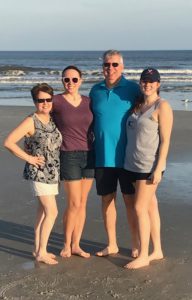 The best part of his four years at seminary was the relationships, Tucker recounts.
The best part of his four years at seminary was the relationships, Tucker recounts.
“Some of my most meaningful friendships are with people I was in seminary with. We would sit around in the cafe when we should have been in chapel, and sometimes we’d run through our theology. It was iron sharpening iron.”
Even following graduation, when everyone went their separate ways, Tucker could meet a former classmate and seek their experience and input on a challenge or ministry concern.
The strong theological education Tucker received challenged the untested and half-formed faith and beliefs that he and his students brought with them, and in so doing, strengthened them.
“At seminary, many of my previously held doctrinal beliefs were challenged,” he said. “I needed a safe place where I could first deconstruct, and then reconstruct, a theology that would stand up.”
It was this process that prepared Tucker not only for many years of local church pastoral ministry but for his ministry now to people who are dying, as well as for their grieving loved ones.
“When I walk into patients’ rooms, they might say, ‘I don’t want to blame God for this, but I’m having a hard time understanding how this could be His will.’ I’m trying to help them gently work through that. I can appreciate how they are wrestling with their understanding of God and the challenges of being human. Many people have unhealthy and unhelpful views of God and faith that they can’t reconcile at end of life. This is very much a part of the world I find my work in.”
The journey from pastor to chaplain
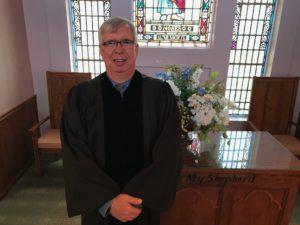 Before finding a second career in hospice chaplaincy, Tucker led a local church in Englewood, Florida, then became an associate pastor in Leesburg and, later, in Lake Worth. After this, God led his family to a church outside Philadelphia, where he served as children’s pastor for 10 years. He spent another 12 years as senior pastor in Charlottesville, Virginia.
Before finding a second career in hospice chaplaincy, Tucker led a local church in Englewood, Florida, then became an associate pastor in Leesburg and, later, in Lake Worth. After this, God led his family to a church outside Philadelphia, where he served as children’s pastor for 10 years. He spent another 12 years as senior pastor in Charlottesville, Virginia.
They then returned to Florida, where Tucker became a staff chaplain with a large, nonprofit hospice that serves 16 counties in northern Florida. The organization has inpatient units, as well as home care and long-term care. Tucker and his co-workers provide spiritual and emotional support for patients, families, and staff. Between the two teams he serves, he often experiences 15 to 30 death situations per week, and performs a handful of funerals each month.
Now a board-certified chaplain, he points back to the unit of Clinical Pastoral Education (CPE) he took his final year at NTS that planted the seeds for his lifelong love of being with and caring for, people.
“As that passion continued to grow, it seemed to move me past my role in the local church. That’s really what got me to where I am. And there was a need and an opportunity.”
Journeying alongside the dying
He comforts families or patients by asking them to share stories, and then he listens.
“It’s all about listening,” says Tucker.
One of his patients was a mother of three children in her 30s. She had served the military in Afghanistan but, as a result of chemical warfare, she came to hospice.
“She was trying to love on her kids in her last days. I picked up an adult-level coloring book so she could color with her daughter. I sat and heard the story of her family. When she cried, I cried. I stayed with her.”
“In some ways, far too late in life, I found my dream job,” he concluded. “I’ve heard it told that some pastors don’t retire, they simply die in the pulpit doing what they love. I kind of see myself that way, too. I love it.”
Learn more about studying at NTS at www.nts.edu/info.

